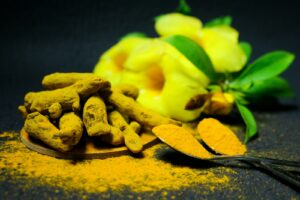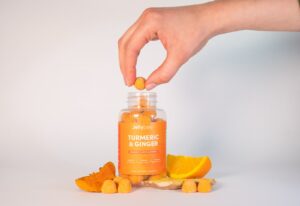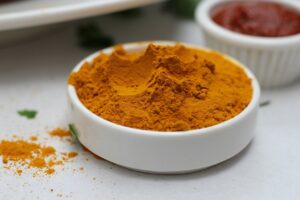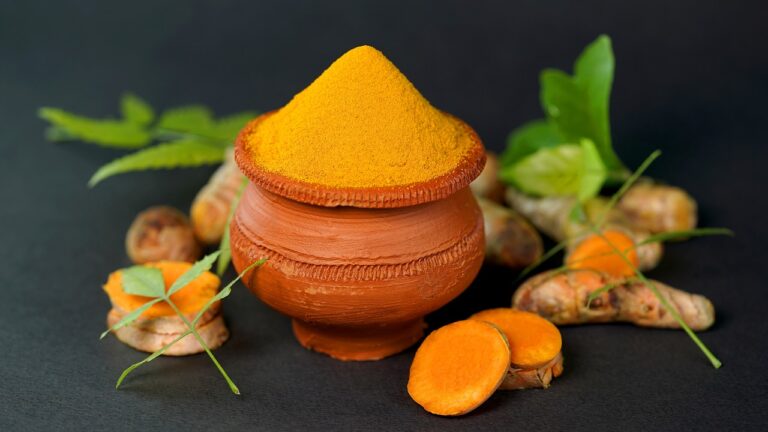Turmeric, a potent herb from the ginger family, boasts centuries of use in Ayurvedic medicine. Renowned for its health advantages attributed to curcumin, an active element with strong antioxidant and anti-inflammatory traits, it’s a coveted supplement within fitness circles. Unveil turmeric’s impact on exercise and its potential in enhancing muscle recovery.
Health Benefits of Turmeric and its Impact on Exercise Performance

Curcumin, which is primarily found in the turmeric root, has been extensively studied for its health benefits. From supporting heart health to offering neurological benefits, the wonders of this compound extend vastly. However, within the context of physical exercise, curcumin’s impact is particularly intriguing.
Scientific research suggests that supplementation with curcumin can positively influence exercise performance and muscle recovery post-exercise. A study published in the Journal of Sports Science & Medicine (J Sports Sci Med) found that curcumin supplementation could mitigate symptoms of delayed onset muscle soreness (DOMS), thus enhancing exercise performance. In addition, a systematic review from Food Science & Nutrition (Food Sci Nutr) revealed that curcumin attenuates oxidative stress associated with muscle soreness, paving the way for faster recovery.
Turmeric’s Action Against Muscle Soreness and Damage
One main advantage of incorporating turmeric supplements as a part of your fitness regime lies in its ability to reduce muscle soreness and muscle damage. Intense resistance exercise can often lead to DOMS, a condition characterized by pain, muscle stiffness, and reduced muscle performance. Turmeric’s ability to alleviate DOMS symptoms comes from its potent anti-inflammatory effects.
Further to this, curcumin supplementation may also prove beneficial in reducing exercise-induced inflammation. A clinical trial reported in the International Society of Sports Nutrition (Int Soc Sports Nutr) highlighted that the use of curcumin can expedite recovery by reducing inflammation and muscle damage associated with eccentric exercises.
The Role of Curcumin in Managing Post-Workout Inflammation
Post-workout inflammation is a normal response of the body that may lead to muscle soreness and delay in recovery. The anti-inflammatory properties of turmeric, specifically curcumin, have gained attention for their role in managing post-workout inflammation.
Curcumin’s impact on inflammatory cytokines, potent mediators of chronic inflammation, has been well-studied. Randomized clinical trials validate that curcumin suppresses these cytokines, leading to reduced inflammation and improved muscle recovery.
Potential for Joint Health

The benefits of turmeric, especially its anti-inflammatory properties, may also promote joint health. The ingredient can aid in reducing the risk of joint arthritis, a condition that affects millions worldwide.
Joint inflammation is quite common, and the associated joint pain can quite often be a deterrent for many. This affects their ability to engage in regular physical exercise, significantly impacting their overall health. Turmeric, with its natural anti-inflammatory properties, can potentially provide relief from this discomfort.
Tips for Incorporating Turmeric into Your Nutrition Routine
Despite its many health benefits, including reducing exercise-induced inflammation, aiding muscle recovery, and promoting joint health, turmeric has notoriously poor bioavailability. To overcome this, pairing the herbal supplement with black pepper, or taking a curcumin supplement specially formulated for improved absorption, can prove beneficial.
Turmeric Supplements: A Potent Herbal Remedy for Workout Recovery and Beyond

Turmeric supplement, an extract of the golden curcumin-rich spice, has been garnering a lot of attention in the world of fitness. Multiple scientific studies back the anti-inflammatory and antioxidant effects of turmeric supplements, suggesting they offer critical sports recovery benefits as well as a host of other general health advantages.
Unlike many synthetic supplements, turmeric is an organic herbal remedy that acts as an excellent supplement for athletes, fitness enthusiasts, and anyone facing oxidative and inflammatory conditions. The holistic, natural approach to combating inflammation and reducing muscle soreness has made these supplements an attractive option.
Turmeric and Metabolic Syndrome: A Potent Duo
Metabolic syndrome refers to a cluster of conditions that raise the risk of heart disease and other health problems like diabetes and stroke. A key trigger for this syndrome is chronic inflammation.
Interestingly, curcumin’s anti-inflammatory properties could have potential benefits against metabolic syndrome. This compound targets several steps in the inflammatory pathway, reducing the production of inflammatory cytokines and inhibiting the growth of pro-inflammatory cells.
Turmeric and Creatine Kinase: A Study

Raised levels of creatine kinase, a key indicator of muscle damage, often occur after intense physical exercise. Studies have shown that curcumin can reduce the release of creatine kinase, therefore minimizing exercise-induced muscle damage and accelerating recovery time.
By including turmeric supplement in one’s exercise regimen, the ability to recover quicker and more effectively from strenuous exercise could be significantly enhanced. Thus, turmeric emerges as not just an herbal remedy, but a potential game-changer in the landscape of fitness nutrition and recovery.
Safety Considerations
Turmeric and curcumin supplements are generally considered safe for most people to use. They are natural herbal remedies that have been a part of human nutrition and medicinal practices for centuries.
However, like with all supplements, potential interactions could occur. These supplements could interact with certain medications, especially those that slow blood clotting or reduce stomach acid. Therefore, if you’re on any long-term medications, it’s vital to understand how turmeric supplement may interact with them.
Moreover, some medical conditions could potentially be affected by high dosages of curcumin, including gallbladder issues or kidney stones.
Therefore, as a safety measure, and to ensure that a supplement routine is as beneficial as possible, it’s prudent to consult with a healthcare professional before starting any new supplementation, including turmeric or curcumin. They can provide clarity about any possible interactions or pre-existing conditions that may affect the use of these supplements.
The Bottom Line – Turmeric’s Impact on Exercise
From the above evidence, it’s clear that the health benefits of turmeric, primarily curcumin, extend far beyond traditional uses. Its role in muscle recovery, reducing muscle damage, and exercise-induced inflammation makes it highly beneficial for those engaging in physical exercise. However, more research is warranted to further validate these benefits.
Whether you’re a fitness enthusiast looking for ways to reduce muscle soreness and inflammation post-workout, or just someone looking for ways to improve joint health and general well-being, considering the incorporation of a curcumin supplement or turmeric itself into your routine may be beneficial. As with anything, moderation is key, and always remember to consult with a healthcare professional before starting any new supplementation regime.

